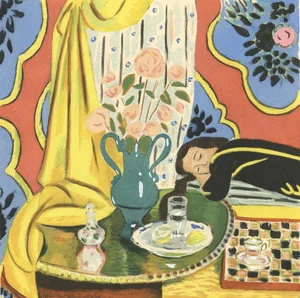5 Eating Disorder Myths that Further Perpetuate the Harmful Stigma
Illustration by Claire Milbrath courtesy of The The New York Times
Eating disorders are a choice, right? Aren’t cis-girls and -womxn the only ones affected by eating disorders? When it comes to eating disorders, as with many psychiatric illnesses, people are quick to judge and stigmatize. Many constantly talk about eating disorders without the facts, further perpetuating these myths that are treated as truth.
Eating disorders are often joked about with people casually saying, “Oh, they look anorexic,” if a someone is natural skinny. I constantly heard this myself growing up, even being called anorexic by classmates. I had a friend that suffered from Anorexia nervosa and saw the emotional toll it took on her and her family, along with the long road to recovery.
College students are especially vulnerable to eating disorders with the major life changes of moving away from home, academic stress, and social pressure to look a certain way. The average age of developing an eating disorder is 19 and 20, usually when people are in the first few years of college. Yet, there has been a skyrocketing number of hospitalizations from 1999 to 2009 of patients aged 45-65, an 88 percent increase.
Since it is Eating Disorders Awareness Week, it’s time to debunk some common myths.
Myth 1: Eating disorders are a choice
Let me be clear: eating disorders are not a choice, it is a disease manifesting in various different types—Anorexia or Bulimia nervosa to Body Dysmorphic Disorder—caused by many factors. Biological, environmental, genetic, and social elements all play a role in eating disorders. Research has shown that genetics could play a role in Anorexia nervosa and bulimia nervosa. The media and society’s “ideal” body types (i.e. thin cis white womxn and muscular cis white men) are triggers for eating disorders. Environmental factors can include being bullied as a child about weight and life stressors like divorce or a death in the family. So no, eating disorders are not a choice. They are the outcome of a lot of different factors affecting a person.
Myth 2: Only cis-girls and womxn have eating disorders
Womxn may have the highest rate of eating disorders, but that doesn’t mean they are the only ones suffering. Females with eating disorders are typically thought to be white teenage girls from middle or upper class backgrounds. However, eating disorders do not affect just this population. Researchers have seen increased cases in men and non-binary individuals in recent years. Different identity groups are affected by eating disorders, but are often afraid to seek help because of stigma. The LGBTQIA+ population are at an increased risk for eating disorders, along with the possible negative internal thoughts about their sexual orientation due to rejection from friends and family, making them an even more vulnerable group.
Myth 3: Only skinny people can have eating disorders
Against popular belief, people of all body types can have eating disorders. It’s typically thought that the extremely emaciated white girl is the only kind of body that can suffer from eating disorders, and it’s usually forgotten that not everyone shows signs of disordered eating in the same way. It is also dangerous to assume that only thin people have eating disorders because people can suffer years with an eating disorder before their BMI is low enough to cause concern. There is no one embodiment of an eating disorder; it can affect any gender, race, ethnicity, and sexual orientation.
Myth 4: Eating disorders aren’t serious
Yes, in fact, eating disorders are very serious. Eating disorders have the highest mortality rate of psychiatric illnesses and can lead to both physical and emotional consequences. Some of the health consequences of eating disorders includes heart attack, kidney failure, osteoporosis, damage to the GI tract, and hormone imbalance. The emotional toll of eating disorders can lead to a low quality of life and thoughts or actions of suicide.
When presented with identical case studies demonstrating disordered eating symptoms in white, Hispanic, and Black womxn, clinicians were asked to identify if the womxn's eating behaviour was problematic. 44% identified the white womxn's eating behaviour as problematic versus 41% for a Hispanic womxn's and 17% for a Black womxn's eating behaviour.
Myth 5: If a friend or family member says they are fine, I believe them.
If you suspect that someone has an eating disorder, it is important to be supportive of them, but also insist on seeking medical treatment from a trained professional. Many people with eating disorders do not want to admit they have one because they want to hide it or are afraid to seek treatment. People with eating disorders may not have self-awareness—a characteristic of these disorders—so they may not even realize they have a problem.
It’s time for people to not only understand the facts about eating disorders, but put an end to other people perpetuating these myths. Call other people out if they are spreading information that is plainly false. If you are suffering from an eating disorder, know that you are not alone. Talk to a trusted friend or adult or contact any of the resources provided below. If you think someone you know may be suffering from an eating disorder, reach out to the resources below and they can contact you to further action.
Resources
The NEDA Helpline is available Monday-Thursday 9AM-9PM ET and Friday 9AM-5PM ET. The hotline can be reached at 800-931-2237.
In crisis situation text “NEDA” to 741741 to be connected with a trained volunteer at Crisis Text Line.
Instant messaging with a trained professional can be found here.
The ANAD Helpline is available Monday-Friday 9AM-5PM CT. The hotline can be reached at 630-577-1330.
A 24/7 Free Confidential Hotline can be reached at 866-957-6953.



